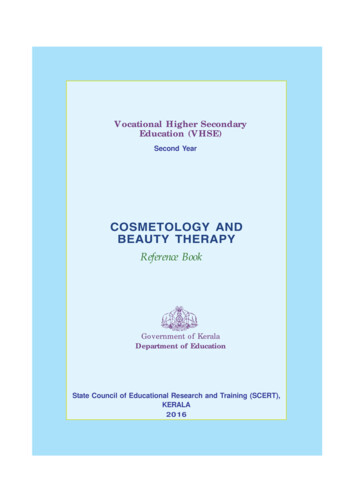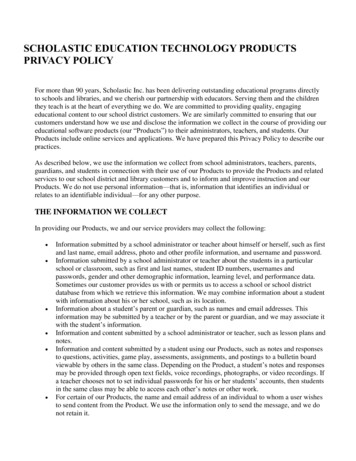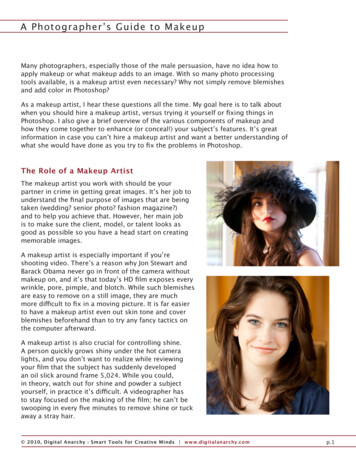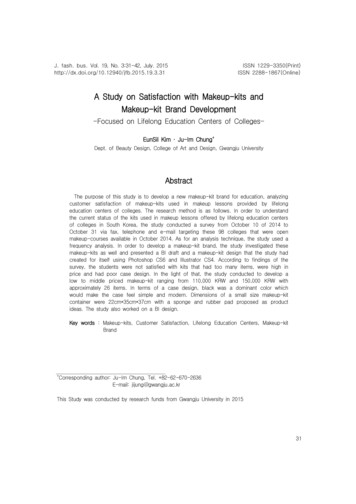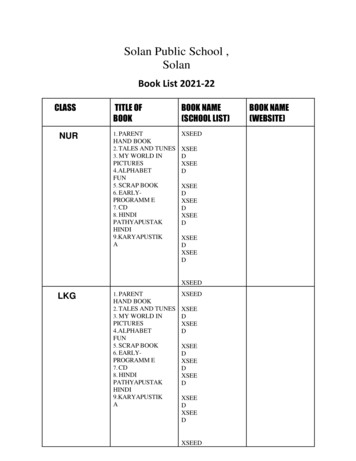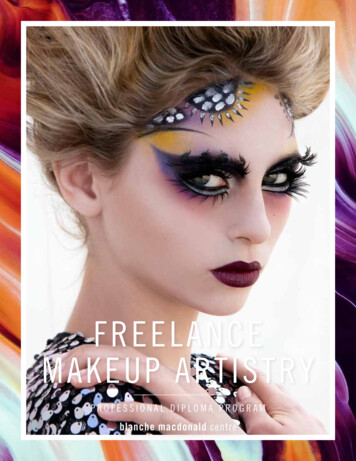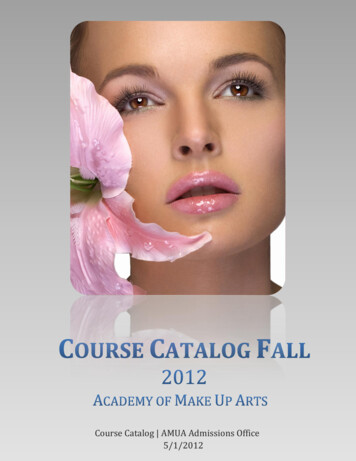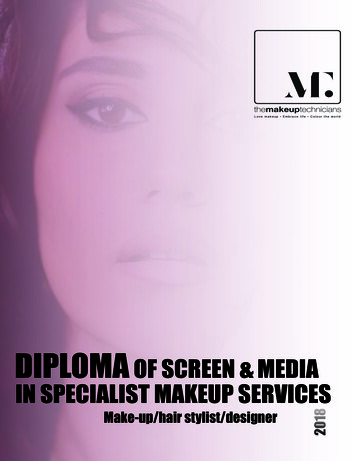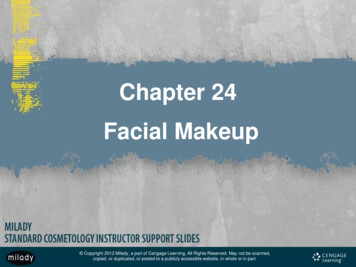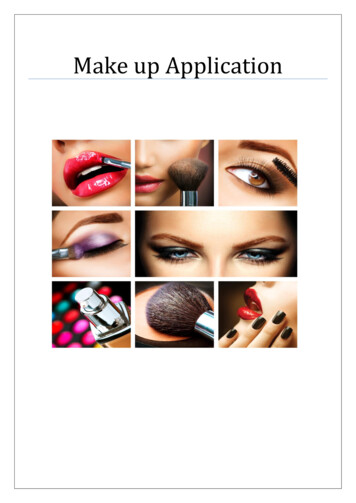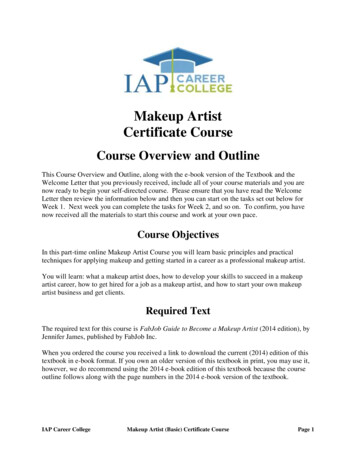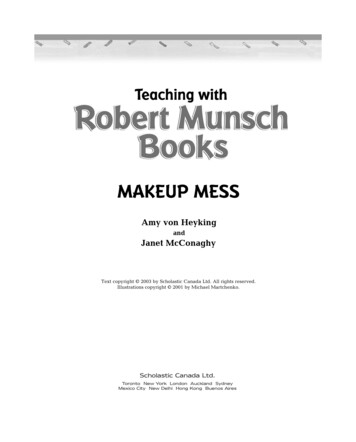
Transcription
Int TEACHING MUNSCH AA.kp407/07/200311:29Page iMAKEUP MESSAmy von HeykingandJanet McConaghyText copyright 2003 by Scholastic Canada Ltd. All rights reserved.Illustrations copyright 2001 by Michael Martchenko.Scholastic Canada Ltd.Toronto New York London Auckland SydneyMexico City New Delhi Hong Kong Buenos Aires
Int TEACHING MUNSCH AA.kp407/07/2003Teaching with Robert Munsch Books 2003 Scholastic Canada Ltd.The story behindMakeup MessMakeup Mess took many yearsto go from story to book. On avisit to Yellowknife in 1984,Robert Munsch thought a storyabout makeup might appeal totwo teenage girls who attendedhis storytelling session. But hewas not very happy with it.Years later, he started tellingthe story again, and found thatit got better and better. In 2001,he decided to use his daughterJulie as the main character. Shewas much older by then, buthe thought back to herdiscovery of eye shadow, anddrew on that memory to writethe book. He changed theending several times. In oneending, Julie’s mother goesupstairs with the makeup tomake herself beautiful. Inanother, Julie uses the moneyshe makes from selling it tobuy candy. Finally, afterlooking at old photographs ofJulie, Michael Martchenkosuggested the “dress up”ending.11:29Page 16MAKEUP MESSSummary:Julie uses all the money she has saved from her birthday,Christmas, and paper route to buy a huge box of makeup.After she returns from the drugstore, she covers her face inpurple, green, and black makeup, colours her hair, and wearsnineteen earrings in one ear and seventeen in the other. Juliethinks she looks beautiful, but her parents don’t seem to agree.Questions:BeforeLook at the front cover. What do you notice about the lettering used in the title? Who do you think the two younger children might be?Look at the back cover. What information can we find out about the author? theillustrator? Who is the child in this book? Read the description on the back, and predict why youthink Julie’s parents were not pleased with her makeup. Record the students’ predictions on a chart.During p. 2: How old do you think Julie might be? Look forclues in the picture to help you. p. 4: Why do you think Julie would want to wearmakeup? p. 11: What do you think the two younger childrenmight be thinking?16
Int TEACHING MUNSCH AA.kp407/07/200311:29Page 17 p. 12: Why are Julie’s parents acting strange? p. 16: Who do you think might be at the door? p. 26: How much money would Julie make from selling the makeup?After Check the chart for students’ predictions. Why did Julie sell her makeup at the end of the story? Suggest to the students that they write their own story entitled“Dress-up Mess.”by KelseyOnce there was a girl named Julia.She was watching her sister Jana playdress up. She thought if Jana couldwear dresses then she could weardresses so she saved up three hundreddollars and she went to town andbought three hundred dresses andshe looked in the mirror and she saidI look BEAUTIFUL! and her mom saidAAAAAA! and she went to go see herdad and he said AAAAA!(2)Teaching with Robert Munsch Books 2003 Scholastic Canada Ltd.(1)Then she wore a yellow and green andgrey dress and she looked in the mirrorand she said I look BEAUTIFUL and themail man came to the door and she saidI better go show the mailmanand the mailman said AAAAAA. and shesaid in think I want to go back to mynormal self. So she gave all her dressupmess away and she went to go show hermom her dad and the mailman and they saidyou look BEAUTIFUL and she went to look inthe mirror and she said I do look nice andshe said I know some thing better Shoes!!(3)(4)Take alookggWhat is out of place on page 16 and 17?gPoint out the name of the drugstore on p. 7.How many of Robert Munsch’s books, or references to hisbooks, can you find in the illustrations throughout the story?17
Int TEACHING MUNSCH AA.kp407/07/2003Activity11:29Page 18#1Spending Munsch MoneyIn this activity, the students will be working with larger denominationsof money — 5, 10 and 20 dollars. They will have the opportunity to addlarger numbers and to make change. This activity also provides time forthe teacher to informally observe the children as they are working inpairs, and to assess their understanding of money.Curriculum Link:Math — money, adding larger numbersMaterials:Enough bins for students to work in pairsSmall objects, e.g. pencils, stickers, erasers, small toysLabels for price tags 100 of Munsch Money for each group (see reproducible on p. 20)Bills (see reproducible on p. 21)Preparation:Teaching with Robert Munsch Books 2003 Scholastic Canada Ltd.Price the items ahead of time. You may want to have the children helpyou determine the prices.Procedure:1. Begin by discussing with the children their experiences with money.Do you get an allowance? Have you spent money at the store? Have youever saved your money to buy something special?2. Look back at page 2 in the story, and point out to the students thatJulie had collected 100. Explain to the students that they are going tohave the opportunity to do some buying and selling using “Munschmoney” in their own store.3. Divide the students into pairs and give eachpair a bin with the items you have priced, theMunsch money and the bills. Explain to thechildren that they are going to take turns beingthe storekeeper and the customer.18
Int TEACHING MUNSCH AA.kp407/07/200311:29Page 194. You may want to model this activity with the whole group before theybegin working in pairs. For example, invite a volunteer to be thestorekeeper and another volunteer to be the customer. Have thecustomer choose two items to buy. The storekeeper will write a bill forthe customer, adding the two items together. The customer will then paythe storekeeper the appropriate amount using his or her Munsch money.5. For students who need more of a challenge, you might suggest thatthey buy three items at a time. You might also encourage the customerto give the storekeeper an amount that would involve getting changeback. They could also try to find as many different ways as they can tospend the 100.Extension:Teaching with Robert Munsch Books 2003 Scholastic Canada Ltd. Read other books about spending money, such as Alexander,Who Used to Be Rich Last Sunday; Pigs Will Be Pigs; andA Bargain for Frances.19
Int TEACHING MUNSCH AA.kp407/07/200311:29lebiucdropRePage 20Munsch MoneyBANK OF MUNSCH BANQUE DE MUNSCHTWENTY VINGT DOLLARS20BANK OF MUNSCH BANQUE DE MUNSCHTEN DIX DOLLARS10BANK OF MUNSCH BANQUE DE MUNSCHTeaching with Robert Munsch Books 2003 Scholastic Canada Ltd.TEN DIX DOLLARS10BANK OF MUNSCH BANQUE DE MUNSCHFIVE CINQ DOLLARS5BANK OF MUNSCH BANQUE DE MUNSCHFIVE CINQ DOLLARS5BANK OF MUNSCH BANQUE DE MUNSCHTWENTY VINGT DOLLARS20BANK OF MUNSCH BANQUE DE MUNSCHTEN DIX DOLLARS10BANK OF MUNSCH BANQUE DE MUNSCHTEN DIX DOLLARS10BANK OF MUNSCH BANQUE DE MUNSCHFIVE CINQ DOLLARS5BANK OF MUNSCH BANQUE DE MUNSCHFIVE CINQ DOLLARS5
Int TEACHING MUNSCH AA.kp407/07/200311:29Page 21leibucodprReSNCHUMMA R TBILL Teaching with Robert Munsch Books 2003 Scholastic Canada Ltd. TOTAL
Int TEACHING MUNSCH AA.kp407/07/2003Activity11:29Page 22#2Friendship CircleIt is important for children to know that they and others around themare unique and beautiful in their own way. They all make valuable anddiffering contributions to the classroom community. This activity willallow the children to reflect on who they are and the qualities that makethem beautiful — inside and out.Curriculum Link:Language Arts — descriptive listmakingSocial Studies — personal identity, respecting others and strengtheningcommunity, working within groupsArt — observation, creativity, fine motor skillsMaterials:Character Webs (see reproducible on p. 24)Class set of Body Shapes (see reproducible on p. 25)Scraps of fabric, coloured yarn, construction paper, plastic eyes,scissors, glueProcedure:1. Divide the students into pairs and ask them to think about the specialTeaching with Robert Munsch Books 2003 Scholastic Canada Ltd.characteristics of their partner.2. Using the reproducible, have the students create character webs ofeach other, by listing the traits that they think make the other personspecial. When the webs are completed, theymight like to share them with the wholegroup.3. Reread page 24 of Makeup Messto the students. What happened that madeJulie realize that she didn’t need makeupto look beautiful?Discuss with the students how we areall special, beautiful, and uniqueindividuals.22
Int TEACHING MUNSCH AA.kp407/07/200311:29Page 234. Each of us has special talents and interests that we can share withothers. Invite the students to use the reproducible template to make apaper model of themselves. Provide them with a variety of materials,e.g. scraps of fabric, construction paper, coloured yarn, coloured tissue,plastic eyes.5. Once the students have completed their self-images, arrangethem in a circle or a line on a bulletin board so that their handsare touching. In the centre of the display you might want to putthe caption, “Friendship Circle” or “Our Classroom Community.”Near each image, attach the character web for that person.Extension:Teaching with Robert Munsch Books 2003 Scholastic Canada Ltd. You could select a “Special Person of the Week.” Each studentin the class could write something special about this personand draw a picture of him or her. These could be compiled intoa book for the Special Person to take home.23
Int TEACHING MUNSCH AA.kp4Teaching with Robert Munsch Books 2003 Scholastic Canada Ltd.lebiucdropRe07/07/200311:29Page 24Character Web
07/07/200311:29Body ShapeleibucodprReTeaching with Robert Munsch Books 2003 Scholastic Canada Ltd.Int TEACHING MUNSCH AA.kp4Page 25
MAKEUP MESS Summary: Julie uses all the money she has saved from her birthday, Christmas, and paper route to buy a huge box of makeup. After she returns from the drugstore, she covers her face in purple, green, and black makeup, colours her hair, and wears nineteen earrings in one ear and seventeen in the other. Julie
